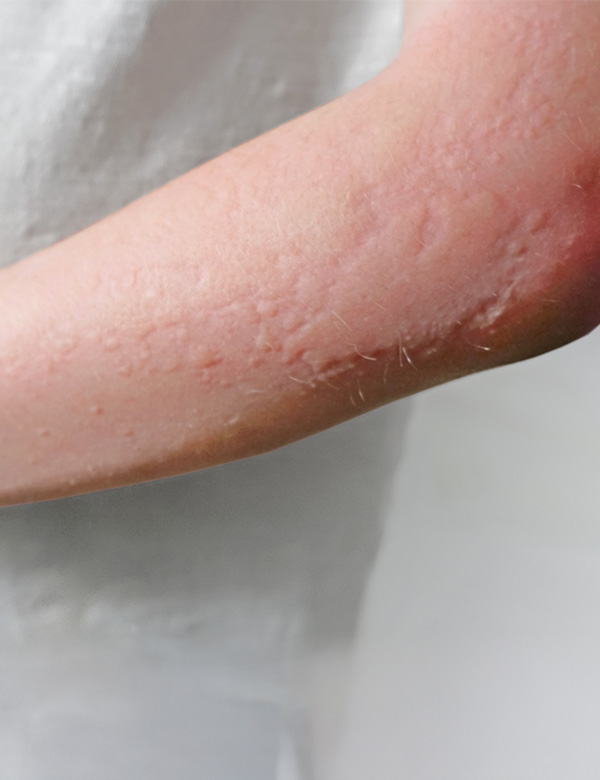Allergic Asthma
Diagnosing and treating allergic asthma – by an experienced allergist and dermatologist at Derma Medical Clinic in Zurich – Sihlcity
Allergic Asthma
Chronische Abszesse und schmerzhafte Knoten durch erfahrenen Hautarzt abklären und behandeln in der Derma Medical Clinic in Zürich - Sihlcity
Shortness of breath, allergic dry cough or wheezing – diagnosis and treatment of breathing problems caused by allergies
Examinations
Allergy testing
Blood test
Process
Initial consultation incl. allergy test
Duration
30 minutes
What Is Allergic Asthma?
Allergic asthma – also called bronchial asthma or allergy-related asthma – is a chronic inflammation of the airways triggered by allergens such as pollen, dust mites or pet hair.
Typical symptoms include wheezing, coughing, shortness of breath and a tight feeling in the chest, often together with other known allergies like hay fever or atopic dermatitis.
Symptoms often occur in episodes, especially during physical activity, at night or when exposed to pollen, house dust or animal hair.
A medical check-up is especially recommended if you …
- often experience shortness of breath, wheezing or a tight feeling in your chest
- notice breathing issues or coughing during pollen season, when exposed to dust or around animals
- already have hay fever or a pollen allergy and now also notice symptoms in the lungs
- frequently have trouble breathing or cough at night
- notice that exercise – like during sports – more often causes breathing problems
- suspect that your breathing problems may be allergy-related

What Is Allergic Asthma?
Allergic asthma – also called bronchial asthma or allergy-related asthma – is a chronic inflammation of the airways triggered by allergens such as pollen, dust mites or pet hair.
Typical symptoms include wheezing, coughing, shortness of breath and a tight feeling in the chest, often together with other known allergies like hay fever or atopic dermatitis.
Symptoms often occur in episodes, especially during physical activity, at night or when exposed to pollen, house dust or animal hair.
Who Should Get Checked for Allergic Asthma?
A medical check-up is especially recommended if you …
- often experience shortness of breath, wheezing or a tight feeling in your chest
- notice breathing issues or coughing during pollen season, when exposed to dust or around animals
- already have hay fever or a pollen allergy and now also notice symptoms in the lungs
- frequently have trouble breathing or cough at night
- notice that exercise – like during sports – more often causes breathing problems
- suspect that your breathing problems may be allergy-related
Treatment
First, we talk about your symptoms and allergy history. At Derma Medical Clinic we perform the following tests:
- Prick test for common allergens (e.g. grass pollen, dust mites, animal hair)
- Blood test if needed for more detailed analysis (small amounts of different allergens are applied to the skin on your forearm and gently pricked)
What does treatment involve?
The goal is to relieve symptoms and prevent asthma attacks.
Depending on the findings and severity, these treatment options may help:
- Asthma inhalers to open the airways and reduce inflammation
- Desensitization therapy for triggers such as pollen, dust or animal hair
What Can I Expect During an Allergic Asthma Check-Up?
Initial consultation
At your first appointment, we take time to understand your symptoms and possible causes.
Allergy test
We then perform an allergy test. Depending on your results, a blood test may also be helpful.
Treatment plan
Depending on your symptoms and allergy triggers, we suggest personalized treatment – such as asthma inhalers or desensitization therapy.

At Derma Medical Clinic, allergy treatment is provided by Dr. Markus Dendorfer, dermatologist and allergy specialist.
He has many years of experience in the diagnosis and treatment of allergic conditions – from hay fever to complex allergic reactions.

Dr. med. Markus Dendorfer
Board-certified Specialist in Dermatology & Venereology FMH
What to Expect from Your Visit
Identifying allergies
Many people don’t know what’s causing their shortness of breath or long-term cough. We test for common triggers like pollen, dust and pet hair – right here in our clinic.
Child-friendly diagnostics & care
We take a gentle and age-appropriate approach with children, explaining everything clearly and supporting families with care and empathy.
Dermatology and allergy care
Many people with allergic asthma also have skin symptoms. At Derma Medical Clinic, you get both – allergy testing and skin diagnosis – in one place.
Everything under one roof
You get diagnosis, medical treatment and cosmetic care all in one location. This means consistent contacts, short pathways and coordinated care – from your first visit through follow-up.
You suspect your breathing problems are allergy-related, but don’t yet have a diagnosis?
Book your appointment now to get tested for allergic asthma at Derma Medical Clinic in Zurich – Sihlcity.
FAQ – Frequently Asked Questions About Allergic Asthma
What is allergic asthma?
Allergic asthma – also called allergic-type bronchial asthma – is a chronic condition of the airways. It is triggered by allergens such as pollen, dust mites or pet hair. These cause inflammation and narrowing of the airways, which leads to symptoms like coughing, shortness of breath and chest tightness.
What are the symptoms of allergic asthma?
Typical symptoms include:
- dry, sudden coughing – especially at night or early morning
- wheezing or rattling sounds when breathing
- shortness of breath during physical activity or when exposed to allergens
- tightness in the chest
Symptoms may be seasonal (e.g. pollen allergies) or year-round (e.g. dust mites).
What causes allergic asthma?
Allergic asthma happens when the immune system overreacts to allergens in the air. When you’re exposed to things like pollen, dust mites, mold or animal hair, your bronchial lining becomes inflamed and your airways narrow – causing typical asthma symptoms.
How is allergic asthma diagnosed?
Diagnosis usually involves:
- detailed medical history (symptoms, triggers, allergies)
- potential lung function test (e.g. peak flow, spirometry – in partnership with specialists)
- Allergy tests (prick test or IgE blood test)
The aim is to identify the cause and assess the severity.
What helps with allergic asthma?
Treatment has several parts:
- Avoiding allergens (e.g. staying away from pollen, dust, pet hair)
- Asthma inhalers (e.g. with cortisone or airway-opening medication)
- Other allergy medications, if needed
- Hyposensitization therapy for long-term relief from certain allergens
What's the difference between desensitization and hyposensitization?
Desensitization and hyposensitization mean the same thing in medicine: a specific immunotherapy, where the body is slowly trained to tolerate an allergen. The aim is to reduce or prevent the allergic reaction over time. “Hyposensitization” is more common in medical terms, while “desensitization” is often used in everyday language.
Can hay fever lead to asthma?
Yes. Doctors call it a “level shift” when untreated hay fever affects the lower airways. If diagnosed and treated early, the risk of developing allergic asthma can be significantly reduced.
What happens during a hyposensitization therapy for allergic asthma?
This immunotherapy helps your immune system get used to the allergen. It usually takes about 3 years – using tablets (SLIT) or injections (SCIT). For pollen or dust mite allergies, it’s often very effective and can greatly reduce asthma symptoms over time.
What should I do during an asthma attack?
During an asthma attack, emergency inhalers with airway-opening ingredients (e.g. salbutamol) help quickly. Important: Always have your inhaler with you. In severe cases, an emergency kit may be needed – and you should call for medical help if necessary.
Can allergic asthma be cured?
A full cure is rare. But: With the right treatment – avoiding allergens, taking medication and regular check-ups – allergic asthma can usually be well controlled. Most people live nearly symptom-free.




